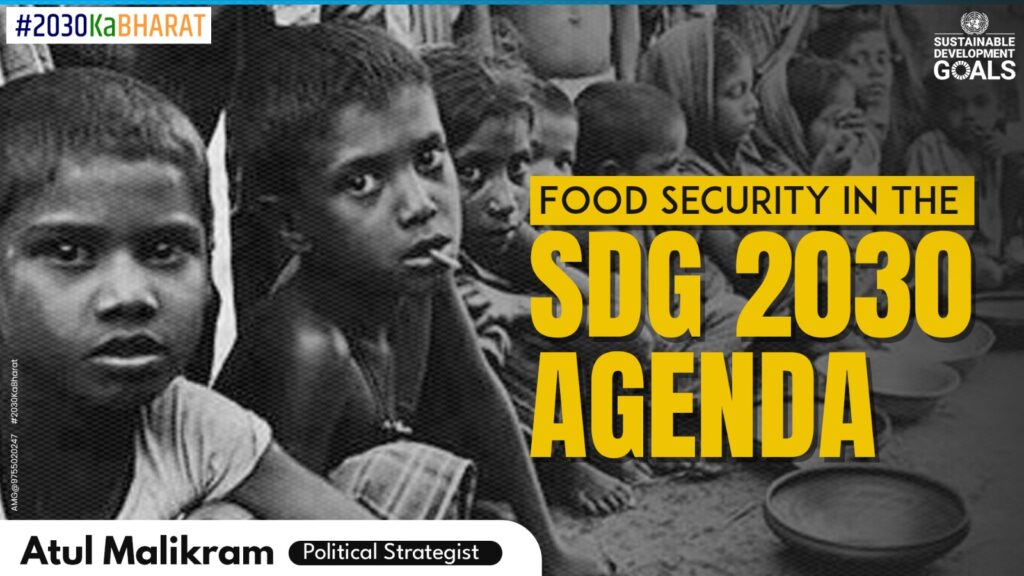In today’s world, achieving Zero Hunger and ensuring food security is a global imperative. As we delve into the Sustainable Development Goals (SDGs) for the year 2030, it’s crucial to explore how these ambitious targets are being pursued, especially in a diverse and populous country like India. In this comprehensive article, we will unravel the intricacies of SDG 2030, its significance in India, and how it aims to eradicate hunger.
Sustainable Development Goals (SDGs) in a Nutshell
The Sustainable Development Goals, often abbreviated as SDGs, are a set of 17 global objectives established by the United Nations in 2015. They represent a universal call to action to end poverty, protect the planet, and ensure prosperity for all by 2030. Among these, Goal 2 holds a special place – “Zero Hunger.” The fundamental idea is to eliminate hunger, improve nutrition, and promote sustainable agriculture.
SDG Goals 2030
As we journey towards the year 2030, the SDGs act as a beacon of hope, providing a road map for a better and more sustainable future. These goals serve as a comprehensive framework to address the world’s most pressing challenges, including the eradication of hunger. SDG Goals aims to harness the collective power of nations and communities to transform our world.
Zero Hunger in India
India, with its vast and diverse population, faces unique challenges when it comes to achieving Zero Hunger. While the nation has made significant strides in the last few decades, there is still work to be done. According to the “State of Food Security and Nutrition in the World 2021” report, around 9.8% of the Indian population is undernourished. To address this issue, India has taken numerous initiatives and aligned them with the SDG Goals agenda.
SDG Goals in India
India has embraced the SDGs, recognizing their potential to drive positive change. The country has integrated these goals into its national development plans and strategies. Notably, India has made substantial progress in several areas, including reducing poverty and improving access to clean water and sanitation.
2030KaBharat: A Movement Towards Zero Hunger
In the quest to achieve Zero Hunger, India has launched “2030KaBharat,” a national movement that aligns with SDG Goals. This movement reflects India’s commitment to eradicate hunger, reduce malnutrition, and enhance food security. “2030KaBharat” is not just a slogan but a promise to every citizen that their nation is working relentlessly to provide them with adequate and nutritious food.
Key Initiatives in India
Several key initiatives are propelling India towards the Zero Hunger target. Let’s take a closer look at some of them:
National Food Security Act
The National Food Security Act (NFSA) of 2013 is a significant step towards ensuring food security for all. It aims to provide subsidized food grains to approximately 800 million people in India. This act plays a crucial role in combating hunger and malnutrition.
Mid-Day Meal Scheme
The Mid-Day Meal Scheme is another pivotal initiative that addresses both hunger and education. It provides free meals to school children, thereby ensuring they receive proper nutrition while attending school.
Pradhan Mantri Matru Vandana Yojana
This government scheme, also known as the Maternity Benefit Program, aims to provide financial assistance to pregnant women and lactating mothers. Ensuring the health and nutrition of mothers is essential to the well-being of both the mother and child.
National Nutrition Mission (Poshan Abhiyan)
The Poshan Abhiyan is a holistic mission to improve nutritional outcomes for children, pregnant women, and lactating mothers. It aims to reduce stunting, undernutrition, and anemia among these vulnerable groups.
The Road Ahead
As we progress towards 2030, the journey to achieve Zero Hunger is paved with determination and innovative solutions. India is making commendable efforts to align its policies, programs, and initiatives with the SDG 2030 agenda. The path to Zero Hunger may be challenging, but with collective will and a focused approach, it is an achievable goal.
The Sustainable Development Goal of achieving Zero Hunger is not just an idealistic dream; it is an actionable target. India, with its diverse landscape and demographic challenges, is committed to making this dream a reality. The SDG 2030 agenda, coupled with initiatives like “2030KaBharat,” the National Food Security Act, and the Mid-Day Meal Scheme, showcases India’s unwavering dedication to providing food security for its people. Together, with the world’s support, we can pave the way towards a future where Zero Hunger is not just a goal but a global reality.
